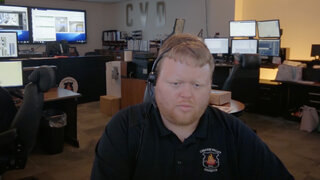'It Takes A Toll On You' — How 911 Dispatchers Deal With The Stress And Trauma Of Their Jobs
The dispatchers in the Oxygen series "911 Crisis Center" love their jobs, but it's still a job rife with stress and tension. Here's how they deal with that.
This article has been updated to reflect the 2022 season of "911 Crisis Center."
One thing you notice right away from watching "911 Crisis Center": The emergency dispatcher job is not one for the faint of heart.
The people who work at Chagrin Valley Dispatch, the emergency dispatch center featured in the Oxygen series "911 Crisis Center," Season 2 of which premieres Saturday, Sept. 3 at 9:30/8:30c with new episodes airing at 9/8c beginning Sept. 10, have to keep their cool and handle life-or-death situations as they answer 911 calls. Not only do they have to extract the necessary information from understandably concerned callers on the scene, but they also have to relay the information they're getting to authorities and often provide lifesaving instructions like how to do CPR, how to handle a stab wound until medical help arrives, or even how to deliver a baby.

"This job is a lot. It takes a toll on your body and soul. You have to be able to balance life, work, work, work, kids, life," Nancy Woodruff, who has been a dispatcher for 30 years, explains in the video, above.
Many of the dispatchers admit they've been left shaken by some of the calls they've received and emergency situations they've heard about firsthand. And even if all ends well, there is still often a lot of yelling, swearing, and pressure.
"People aren't calling us because they're having a good day. They're calling us because they're having the worst day of their lives," Arnold Rinas, a dispatcher for 15 years, says.
It's the kind of environment that could definitely tax someone's mental state. Luckily, many of the workers are close friends, and they use jokes, laughter, snacks, and comforting words to make it through a shift. Many elect to join the Peer Support Program, which allows them to identify the body language and tone they should look out for, and the advice they can give to employees who seem stressed or burnt out, whether it be breathing exercises or other techniques.
Above all else, "self care is so important. You have to make that time for yourself," McCavish stated.
For some, that's spending time with family, or indulging in unique hobbies, or investing in their romantic relationships. And for many of the dispatchers, it's making time for their canine companions. Unsurprisingly, a lot Chagrin Valley Dispatch workers turn to their dogs after a tough day on the job.
For more on how the dispatchers handle trauma and the Peer Support Program, watch the video above. And make sure you catch the Season 2 premiere of "911 Crisis Center," airing Saturday, Sept. 3 at 9:30/8:30c with new episodes airing at 9/8c beginning Sept. 10.






















